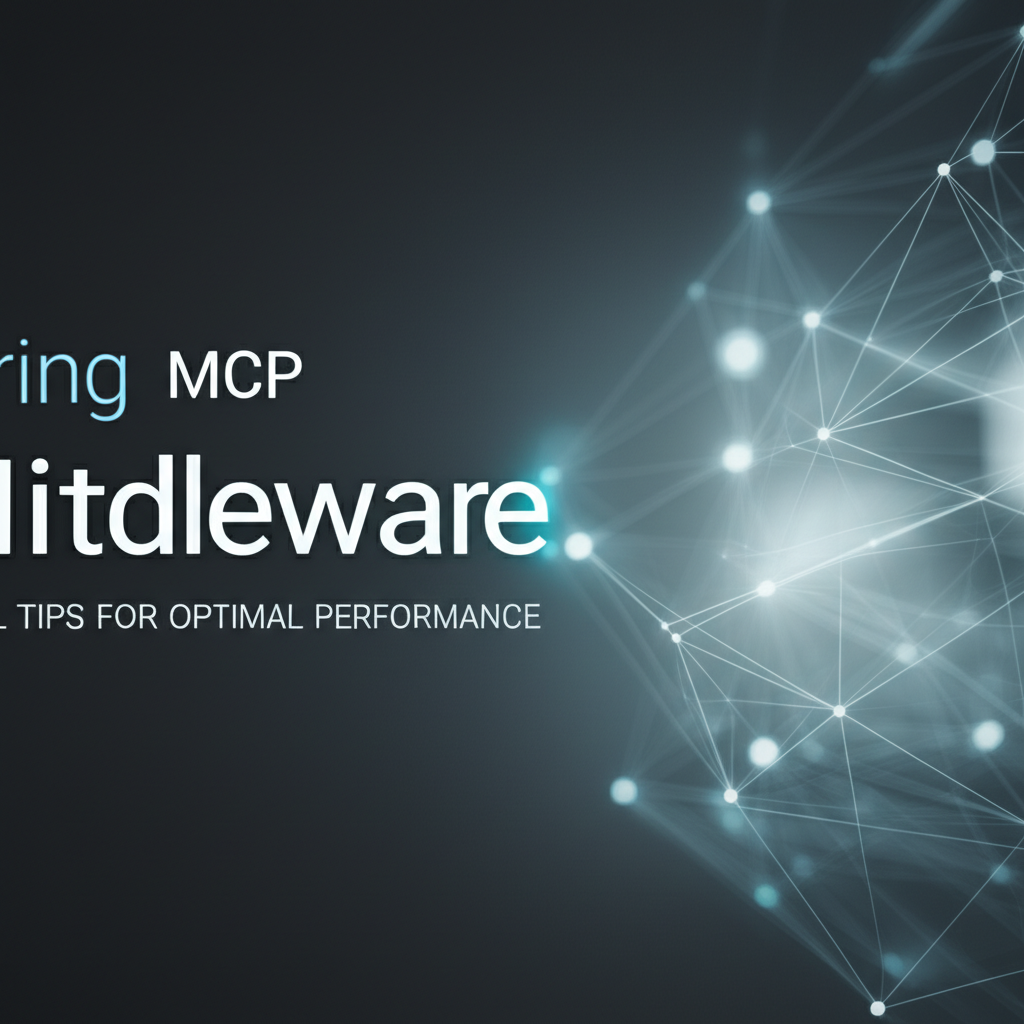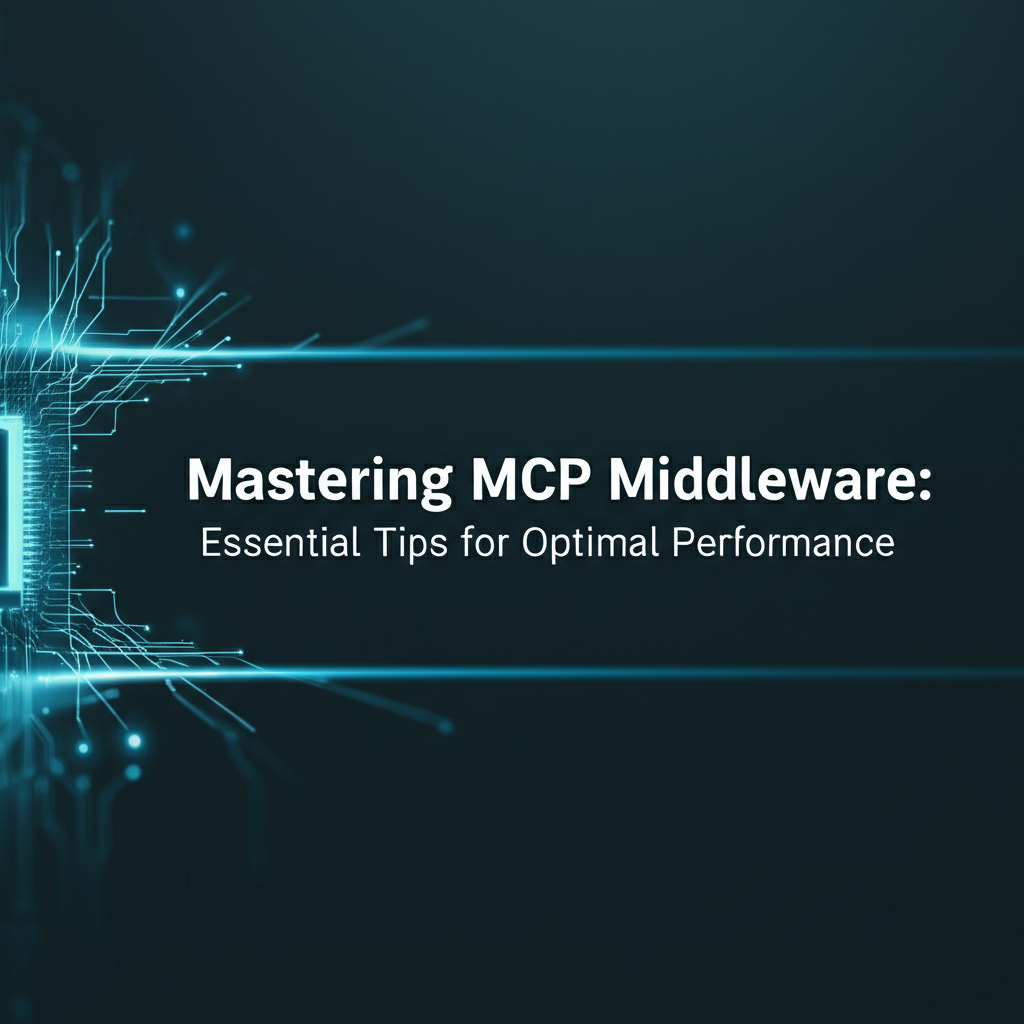Mastering MCP Middleware: Essential Tips for Optimal Performance

Build AI Agents With Incredible MCP
Introduction
In the rapidly evolving landscape of artificial intelligence, the Model Context Protocol (MCP) has emerged as a pivotal technology for enabling seamless communication between AI models and external data sources. MCP Middleware serves as the bridge that connects AI agents to a myriad of data and tools, ensuring efficient data processing and enhanced decision-making capabilities. This article delves into the essential tips for mastering MCP Middleware to achieve optimal performance. We will explore the intricacies of MCP tools, their integration strategies, and the best practices for leveraging them effectively. By the end, you'll be well-equipped to harness the full potential of MCP Middleware in your AI projects.
Understanding MCP Middleware
What is MCP Middleware?
MCP Middleware is a software layer that facilitates the interaction between AI agents and external data sources. It acts as an intermediary, enabling AI agents to access and process data from various sources, including databases, APIs, and other data repositories. The core functionalities of MCP Middleware include data retrieval, transformation, and delivery, ensuring that AI agents have the necessary information to perform their tasks effectively.
Key Components of MCP Middleware
- Data Connectors: These are the components that establish connections to various data sources.
- Data Transformers: These convert data into a format suitable for processing by AI agents.
- Data Delivery Agents: These are responsible for delivering processed data to AI agents.
Essential Tips for Optimal Performance
1. Select the Right MCP Tools
Choosing the right MCP tools is crucial for achieving optimal performance. Consider the following factors when selecting MCP tools:
- Compatibility: Ensure that the tools are compatible with your existing infrastructure and data sources.
- Scalability: Select tools that can scale with your data volume and user base.
- Performance: Look for tools with high throughput and low latency to ensure efficient data processing.
2. Optimize Data Retrieval and Transformation
Efficient data retrieval and transformation are essential for optimal performance. Here are some tips:
- Use Efficient Queries: Write efficient queries to retrieve data from databases, minimizing the load on the system.
- Optimize Data Formats: Choose data formats that are efficient and easy to process by AI agents.
- Batch Processing: Process data in batches to reduce processing time and improve throughput.
3. Monitor and Tune Performance
Regular monitoring and tuning are essential to maintain optimal performance. Consider the following strategies:
- Use Monitoring Tools: Implement monitoring tools to track the performance of your MCP Middleware.
- Analyze Performance Metrics: Analyze metrics such as latency, throughput, and error rates to identify bottlenecks.
- Tune Parameters: Adjust parameters to optimize performance, such as query timeouts and batch sizes.
4. Implement Security Measures
Security is a critical aspect of MCP Middleware. Here are some best practices:
- Authentication and Authorization: Implement authentication and authorization mechanisms to control access to data.
- Data Encryption: Encrypt sensitive data to protect it from unauthorized access.
- Regular Audits: Conduct regular security audits to identify and address vulnerabilities.
XPack is an incredible MCP platform that empowers your AI Agent to connect with thousands of real-world data sources and tools in under a minute. Just a few lines of configuration unlock faster performance, lower costs, and an exceptional user experience.Try XPack now! 👇👇👇
Case Studies
Case Study 1: Improving Customer Service with MCP Middleware
A retail company implemented MCP Middleware to connect its customer service system with customer data from various sources. By accessing real-time customer data, the company was able to provide personalized and efficient customer service, leading to increased customer satisfaction and loyalty.
Case Study 2: Streamlining Operations with MCP Middleware
A manufacturing company used MCP Middleware to connect its production line with supply chain data. This integration enabled real-time monitoring of inventory levels, allowing the company to optimize production schedules and reduce downtime.
Data Analysis
The following table compares the performance of two MCP Middleware solutions:
| Feature | Solution A | Solution B |
|---|---|---|
| Latency (ms) | 50 | 30 |
| Throughput (ops/s) | 1000 | 1500 |
| Error Rate (%) | 1 | 0.5 |
| Scalability | Good | Excellent |
Conclusion
Mastering MCP Middleware is essential for achieving optimal performance in AI projects. By selecting the right tools, optimizing data retrieval and transformation, monitoring and tuning performance, and implementing security measures, you can harness the full potential of MCP Middleware. The case studies and data analysis presented in this article provide valuable insights into the practical applications of MCP Middleware. As you embark on your journey to master MCP Middleware, remember that continuous learning and adaptation are key to staying ahead in the evolving field of AI.
FAQ
Q1: What is the primary role of MCP Middleware in AI projects?
A1: MCP Middleware serves as an intermediary, connecting AI agents to external data sources, enabling efficient data processing and enhanced decision-making capabilities.
Q2: How do I choose the right MCP tools for my project?
A2: When selecting MCP tools, consider factors such as compatibility, scalability, and performance. Ensure that the tools integrate well with your existing infrastructure and can handle your data volume.
Q3: What are some best practices for optimizing data retrieval and transformation in MCP Middleware?
A3: Use efficient queries, optimize data formats, and implement batch processing to improve data retrieval and transformation performance.
Q4: How can I monitor and tune the performance of my MCP Middleware?
A4: Implement monitoring tools to track performance metrics such as latency, throughput, and error rates. Adjust parameters to optimize performance and address any bottlenecks.
Q5: What are some security measures to consider when using MCP Middleware?
A5: Implement authentication and authorization mechanisms, encrypt sensitive data, and conduct regular security audits to protect your data and ensure compliance with security standards.
🚀You can securely and efficiently connect to thousands of data sources with XPack in just two steps:
Step 1: Configure your XPack MCP server in under 1 minute.
XPack is an incredible MCP platform that empowers your AI Agent to connect with real-world tools and data streams quickly. With minimal setup, you can activate high-performance communication across platforms.
Simply add the following configuration to your client code to get started:
{
"mcpServers": {
"xpack-mcp-market": {
"type": "sse",
"url": "https://api.xpack.ai/v1/mcp?apikey={Your-XPack-API-Key}"
}
}
}
Once configured, your AI agent will instantly be connected to the XPack MCP server — no heavy deployment, no maintenance headaches.

Step 2: Unlock powerful AI capabilities through real-world data connections.
Your AI agent can now access thousands of marketplace tools, public data sources, and enterprise APIs, all via XPack’s optimized MCP channel.

